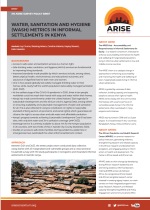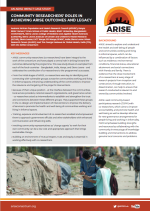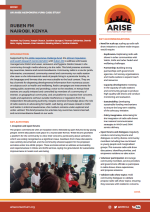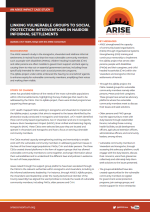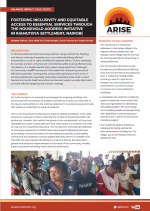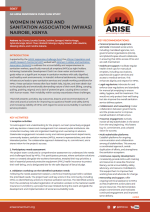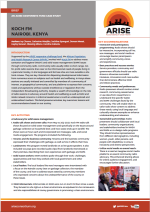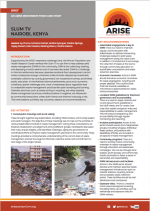Between 2021 and 2022, the ARISE project team conducted data collection using diaries with 32 marginalised and vulnerable groups and a cross-sectional household survey with 1761 study participants in Korogocho and Viwandani informal settlements in Nairobi, Kenya. This brief outlines the findings from this survey. .
Urban informality, often viewed negatively, is not solely the product of the urban poor but also reflects the failure of formal systems to adapt. Informal workers, who make up about 61% of the global workforce, operate outside formal labor laws and significantly contribute to urban development. Understanding and harnessing community capitals are vital for sustainable […]
ARISE aimed to explore and understand the health and well-being of people and communities working and living in informal spaces, which can be influenced by a combination of factors such as residence, environmental conditions, financial status, educational attainment and social connections with friends and family. There is evidence that the close involvement of co-researchers at […]
Supported by the ARISE responsive challenge fund, the African Population and Health Research Centre (APHRC) worked with Ruben FM to address solid waste management (SWM) and water, sanitation and hygiene (WASH) issues in the community through media advocacy via the radio. This brief presents activities, key outcomes, lessons and recommendations. Community radio is a not-for-profit, […]
The ARISE research study in the Korogocho, Viwandani and Mathare informal settlements in Nairobi found that the most vulnerable community members such as people with disabilities (PWDs), children heading households (CHH) and older persons are often invisible to government support and lack agency, causing them to miss out on essential government services, including those specifically […]
In informal settlements like Kiamutisya (Nairobi, Kenya), where fires, flooding, and disease outbreaks frequently occur, accurately identifying affected households is crucial for rapid and effective response efforts. Cholera outbreaks, for example, are best contained and controlled by swiftly locating affected areas. The absence of a reliable identification system poses significant challenges for Community Health Promoters […]
An ARISE Case Study by Wairutu Jane, Milka Kori, Emily Wangari, Jacob Omondi and Joseph Kimani In informal settlements like Kiamutisya (Nairobi, Kenya), where fires, flooding, and disease outbreaks frequently occur, accurately identifying affected households is crucial for rapid and effective response efforts. Cholera outbreaks, for example, are best contained and controlled by swiftly locating […]
Supported by the ARISE responsive challenge fund, the African Population and Health Research Centre (APHRC) worked with Women in Water and Sanitation Association (WIWAS) to address the accountability and responsiveness to sanitation workers, specifically manual pit emptiers (MPEs) as right holders. Achieving Sustainable Development Goal 6 on clean water and sanitation goals relies on a […]
Supported by the ARISE responsive challenge fund, the African Population and Health Research Centre (APHRC) worked with Koch FM to address water, sanitation and hygiene (WASH), and solid waste management (SWM) issues through community radio. Community radio usually refers to short-range, not-for-profit radio stations that cater to the informational needs of people living in a […]
Supported by the ARISE responsive challenge fund, the African Population and Health Research Center worked with Slum TV to use film to help address solid waste management (SWM) in the community. SWM is the collecting, treating and disposing of solid material once it has been discarded. SWM is a challenge in informal settlements because: absentee […]
